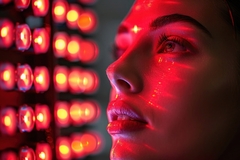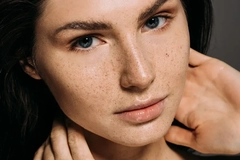Pixel privacy: Haut.AI Skin Atlas gets patent for facial image anonymization tech

Haut.AI attains a US patent for its “first of its kind” Skin Atlas system to anonymize facial images. The technology promises to remove personal identifiers and non-skin-related data from facial images for consumers concerned about privacy and security.
The SaaS platform-powered company says e-commerce and clinical skin analysis can benefit as the AI is designed to provide personalized skin analysis and product recommendations by combining facial image capture with algorithms.
Haut.AI believes it is setting new standards in the industry by prioritizing data privacy to create greater consumer trust and confidence. The process begins with an image sent to the cloud for processing, whereby the company’s anonymization technique only studies skin pixels for analysis.
Personal Care Insights speaks to Anastasia Georgievskaya, CEO and co-founder at Haut.AI, to learn about privacy in cosmetics, regulations and how the technology uses images while also retaining anonymity during analysis.
What inspired you to create the Skin Atlas technology, and what is the current debate about privacy in cosmetics?
Georgievskaya: The development of Skin Atlas was a natural progression in our goal to make personalized beauty experiences more accessible and trustworthy, as well as consistently increase the accuracy and speed of our AI Skin Analysis.
 Georgievskaya says details like lips, hair, background or eye features for accurate skin analysis are not needed.In the beauty and skin care industry, personalization has become an essential demand, with consumers expecting tailored experiences. However, the collection and processing of personal data needed to provide that level of personalization, especially facial images, raises significant privacy concerns. I don’t think there is a lack of attention to privacy, as the increasing number of regulations makes it difficult for businesses to ignore. The real challenge lies in how to provide the level of personalization customers demand while complying with all these regulations and ensuring secure data processing and storage. For many brands, meeting these privacy demands is both costly and technically challenging. They need a technology provider that can manage both personalization and privacy seamlessly, and that’s where Haut.AI comes in.
Georgievskaya says details like lips, hair, background or eye features for accurate skin analysis are not needed.In the beauty and skin care industry, personalization has become an essential demand, with consumers expecting tailored experiences. However, the collection and processing of personal data needed to provide that level of personalization, especially facial images, raises significant privacy concerns. I don’t think there is a lack of attention to privacy, as the increasing number of regulations makes it difficult for businesses to ignore. The real challenge lies in how to provide the level of personalization customers demand while complying with all these regulations and ensuring secure data processing and storage. For many brands, meeting these privacy demands is both costly and technically challenging. They need a technology provider that can manage both personalization and privacy seamlessly, and that’s where Haut.AI comes in.
Why is facial image anonymization technology important and how does it meet consumer demand?
Georgievskaya: Facial images are highly sensitive data, and consumers today are more aware of how and where their data is used, making them cautious about sharing it. While they want personalized experiences, they also need assurance that brands take all necessary measures to protect their data. If consumers don’t feel confident their data is safe, they simply won’t use these personalized technologies.
Skin Atlas solves this perfectly. AI-driven skin analysis requires users to submit photos, and this often raises concerns: “Am I showing too much of my surroundings?” “Where does this image go?” or “Will it be used in marketing materials later?” Skin Atlas addresses these concerns by ensuring that personal information is never recorded. Brands can continue offering personalized product recommendations, but customers can be confident that the image they submit is processed only in the form of a “Skin Atlas” — essentially just the skin portion, stripped of all identifying features.
 Skin Atlas essentially just sees the skin portion, stripped of all identifying features.Building trust around this technology may take time, but Skin Atlas provides the essential first step by ensuring that consumers’ sensitive data is fully protected from the start.
Skin Atlas essentially just sees the skin portion, stripped of all identifying features.Building trust around this technology may take time, but Skin Atlas provides the essential first step by ensuring that consumers’ sensitive data is fully protected from the start.
There is a lack of regulation on AI globally, with exceptions such as the EU AI Act. How does your technology relate to regulatory concerns?
Georgievskaya: We believe the industry is moving toward a future where AI technology will be more regulated, and here in Europe, we are already feeling the regulatory pressure. The EU AI Act, for example, is a clear indicator of how AI regulation is evolving.
While AI regulation is still developing globally, we are proactive in aligning our technology with existing frameworks, such as GDPR, which is essential for data privacy and security. Skin Atlas, by anonymizing facial images and minimizing data collection, ensures compliance with current privacy regulations.
Ultimately, we see regulation as an important step forward for the industry, ensuring ethical and responsible AI use, which helps us build trust with both consumers and partners.
How does the technology work by scanning facial data while also retaining anonymity — is this not contradictory?
Georgievskaya: At first glance, it might seem contradictory, but the way Skin Atlas works allows us to analyze the skin while completely anonymizing the person. The process begins with detecting facial key points, which help align and standardize the image. From there, we use algorithms to separate the skin from non-skin areas, such as the hair and background. These non-essential elements are removed, and we generate photo-realistic skin patterns to replace them, leaving only the skin data necessary for analysis.
Interestingly, we don’t need details like lips, hair, background or eye features for accurate skin analysis. Removing these elements does not compromise the quality of the assessment; instead, it enhances user privacy. For consumers, this means they can stay anonymous while still receiving high-quality, personalized skin care recommendations. Knowing their image is processed securely and only relevant skin data is analyzed makes the experience far less intimidating, encouraging more people to engage with AI-driven skin analysis tools.













